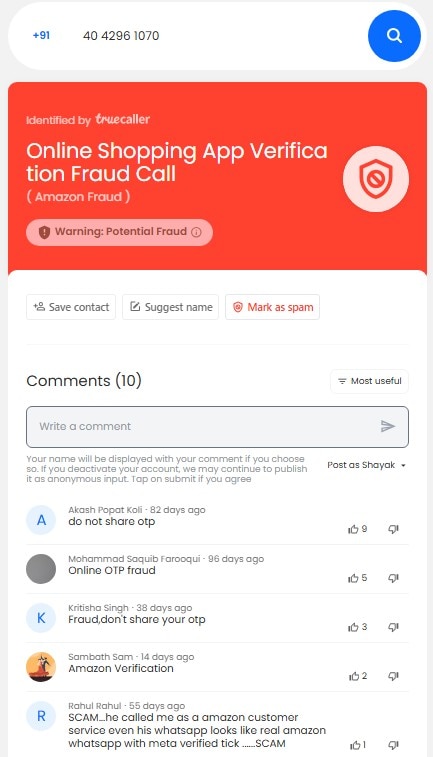What started as a routine weekend of receiving online orders quickly took a suspicious turn for me. After accepting a series of cash-on-delivery Amazon parcels on May 17-18 and paying through QR codes shown by delivery agents, everything seemed normal — until a call came in on May 19 around 8:20 pm.
The number was flagged by Truecaller as Customer Care, but it wasn’t the usual verified Amazon or courier service ID. Instead, it was a plain 10-digit number — an early red flag.
“You had received an order a few days back, you have received an OTP for the same, please share it with me,” said the caller in Hindi.
At that moment, a 6-digit OTP appeared on WhatsApp from a business account labelled Amazon Verification. It looked eerily legitimate. For a brief second, I almost complied — after all, I DID receive the packages this guy was referring to. But something about the caller’s impatient and unpolished tone didn’t sit right.
When asked, “What did I order? Could you tell me?”, the caller dodged, saying, “We don’t have records of delivery details for your security. Now, please share the OTP with me so that we can finish this call.”
That was the final warning. I disconnected and checked my Amazon app — no pending deliveries.
Meanwhile, the number kept calling, pushing urgency.
I went to Truecaller to check the WhatsApp number and immediately saw that it was flagged by multiple users as a scam. I blocked the number immediately, flagged it as OTP Fraud, and reported the incident.

OTP Scams: Smarter, Faster, and More Dangerous
Scams have evolved from typo-ridden SMS messages to professional-looking impersonations, often with fake verified business accounts on WhatsApp. With easily accessible AI tools, fraudsters can now craft convincing profiles to mimic official Amazon support.
Even worse, rogue delivery agents might be tipping off scammers with customer information, making the con seem more believable.
Amazon has issued a stern reminder: it will never ask for OTPs over a phone call or via WhatsApp. If you receive a call or message claiming to be from Amazon and requesting this information, it’s likely a scam, the company warns.
OTPs are only to be shared with delivery agents at your doorstep during a delivery — never afterwards.
The Real Cost of Sharing an OTP
Cybercriminals often manipulate emotions — urgency, fear, or confusion — to trick users into sharing OTPs. Once they have it, they can access sensitive accounts or even siphon money.
And the threat is very real. According to data from the Indian Cyber Crime Coordination Centre (I4C), over Rs 1,750 crore was lost by Indian citizens to cyber fraud between January and April 2024 alone. More than 740,000 complaints were registered on the government’s cybercrime portal in just the first four months of this year.
The numbers reflect an alarming spike — daily cybercrime complaints averaged 7,000 in May 2024, a staggering 113.7% jump from 2021-2023 levels. Financial fraud made up 85% of these cases, with OTP scams being a major category.
The scam landscape is constantly morphing from fake investment schemes to illegal lending apps and now OTP cons. In just the first four months of 2024, losses from trading scams touched Rs 1,420 crore, while digital arrests led to another Rs 120 crore lost in 4,599 incidents.
How To Stay Safe: Simple Rules, Big Impact
- Never share your OTP with anyone over calls or messages — even if they claim to be from a legitimate brand.
- Cross-check any suspicious call by visiting Amazon’s official app or contacting their support.
- Report scams immediately via amazon.in/reportascam or call the 1930 cybercrime helpline.
- Trust your instincts — if a call feels off, hang up and verify.
- Avoid reacting to urgency — scammers count on pressure to cloud your judgment.
In the end, a little hesitation might just save your wallet and your data. Stay cautious, stay informed.

